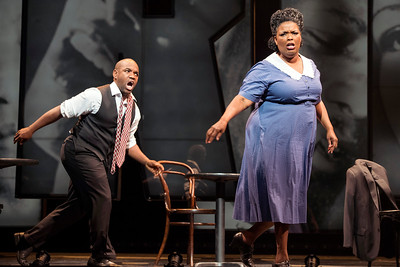Hackney Empire, 9 June 2017
If this was not quite ENO on the road again, it was good to see them working away from the Coliseum. A joint venture with Opera Philadelphia brought Daniel Schnyder’s recent work based on the life of Charlie Parker, Yardbird, to North London and an excellent choice of venue. The Hackney Empire is a Frank Matcham building and as such a more intimate version of the Coliseum itself – perfect acoustically and a more intimate size for an intimate opera.
Daniel Schnyder and his librettist, Bridgette A Wimberly present us with a series of scenes linked to individual musical structures, all in turn linked to the life of jazz composer and saxophonist, Charlie Parker.
The one act work starts and ends with the composer’s death, and is seen through the eyes of his ghost, who characters seem to accept without question, knowing he is dead but talking to him as if he is still alive.
The score is apparently based on Charlie Parker’s own compositions though I have to admit that for those of us with a background in classical music and opera there was little that was familiar. The scenes are essentially lyrical, some settling gently into song, while others have a Bergian edge to them which helps the dramatic impact. One of the largest problems with the work is the failure of the libretto to create characters with whom we can relate. Too often we are given generalised or two-dimensional situations which are then passed over as we move on. At one point Charlie – the excellent Lawrence Brownlee – begins to open up about this failing faith and the conflict between belief and his drug taking. The whole evening could easily have focussed on and expanded just this, but it vanished all too soon and we had moved to another situation. One of the few exceptions, beside Charlie himself, was Angela Brown, as his mother Addie, who grew in stature as the evening progressed.
Another on-going problem was the relentless dynamic level of the score. The late scene in the mental hospital came as a real relief, with its gentle, reflective setting and the quiet keening of Elena Perroni. This was followed by an introspective quintet which proved to be the most memorable music of the evening.
The small ensemble, under Clark Rundell, is effective within the closer acoustic, and Ron Daniels’ production moved smoothly within Riccardo Hernandez and Scott Zielinski’s designs.
As the first of a number of planned collaborations this may not have quite hit the heights hoped for but was more than positive enough to look forward to the next.

